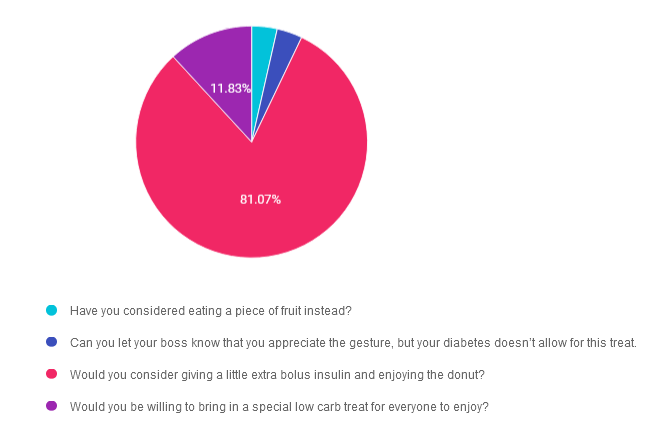For last week’s practice question, we quizzed participants on helping people address special treat days. The majority of respondents chose the best answer. We want to clarify and share this important information, so you can pass it on to people living with diabetes and your colleagues, plus prepare for exam success!
Before we start though, if you don’t want any spoilers and haven’t tried the question yet, you can answer it below: Answer Question

Question:
You are reviewing JR’s ambulatory glucose profile and it is over 70% time in range. JR usually takes bolus insulin before each meal and basal insulin at night. However, you notice that once a week on Fridays, JR’s blood glucose levels are above target between 2-5pm. When you bring this Friday glucose elevation to JR’s attention, they tell you it’s because the boss always brings in donuts after lunch on Fridays to celebrate everyone’s hard work. JR asks you about strategies to address this time above target.
What is the wise approach?
Answer Choices:
- Have you considered eating a piece of fruit instead?
- Can you let your boss know that you appreciate the gesture, but your diabetes doesn’t allow for this treat.
- Would you consider giving a little extra bolus insulin and enjoying the donut?
- Would you be willing to bring in a special low carb treat for everyone to enjoy?

Getting to the Best Answer
Answer 1 is incorrect. 3.55% chose this answer. “Have you considered eating a piece of fruit instead?” Even though fruit might be a healthier choice, it may not be the “wise” choice for this situation. The ADA Standards encourage us to help individuals “maintain the pleasure of eating.” An occasional donut to celebrate hard work can certainly be included in JR’s meal plan.
Answer 2 is incorrect. 3.55% of you chose this answer. “Can you let your boss know that you appreciate the gesture, but your diabetes doesn’t allow for this treat.” JR can choose to make a “wise” decision and participate in the festivities. The ADA Standards encourage us to help individuals “maintain the pleasure of eating.” An occasional donut to celebrate hard work can certainly be included in JR’s meal plan.
Answer 3 is correct. About 81.07% of respondents chose this. “Would you consider giving a little extra bolus insulin and enjoying the donut?” JR can choose to make a “wise” decision and participate in the festivities and take a little extra insulin to prevent post treat hyperglycemia. The ADA Standards encourage us to help individuals “maintain the pleasure of eating.” An occasional donut to celebrate hard work can certainly be included in JR’s meal plan.
Finally, Answer 4 is incorrect. 11.83% chose this answer. “Would you be willing to bring in a special low carb treat for everyone to enjoy?” JR can choose to make a “wise” decision and participate in the festivities. The ADA Standards encourage us to help individuals “maintain the pleasure of eating.” An occasional donut to celebrate hard work can certainly be included in JR’s meal plan.
We hope you appreciate this week’s rationale! Thank you so much for taking the time to answer our Question of the Week and participate in this fun learning activity!
Want to learn more about this question?
Invite Coach Beverly Thomassian to Speak – In Person or Virtually!
An Innovative Approach to Diabetes Education
With over two decades as a thought leader in diabetes care and education, Beverly is an inspiring and informational presenter. She can delve deep into the science of diabetes while incorporating real-life applications coupled with a compassionate approach that resonates with healthcare professionals.
Beverly is a relentless advocate for non-judgmental and inclusive diabetes care and believes that we are at our best when we are curious, kind, and engaging.
As a nurse entrepreneur and professional speaker, Beverly champions person-centered and evidence-based diabetes care through her live courses, keynote speeches, and webinar presentations.
Coach Beverly makes it a priority to make time to teach at conferences and organizations across the country. In addition to providing the latest research-based information, she incorporates story telling, games, movement breaks and small group activities.
She believes people learn best when the content is meaningful and fun!
Participants leave feeling energized, inspired, and excited about providing best diabetes care.
See more info here >>
Sign up for Diabetes Blog Bytes – we post weekly Blog Bytes that are informative and FREE! Every week we post one exam practice Question of the Week and Rationale of the Week. Sign up below!
The use of DES products does not guarantee the successful passage of the diabetes certification exams. CBDCE & ADCES does not endorse any preparatory or review materials for the certification exams, except for those published by CBDCE & ADCES.
**To satisfy the requirement for renewal of certification by continuing education for the Certification Board for Diabetes Care & Education (CBDCE), continuing education activities must be applicable to diabetes and approved by a provider on the CBDCE List of Recognized Providers (www.ncbde.org). CBDCE does not approve of continuing education. Diabetes Education Services is accredited/approved by the Commission of Dietetic Registration which is on the list of CBDCE Recognized Providers.










